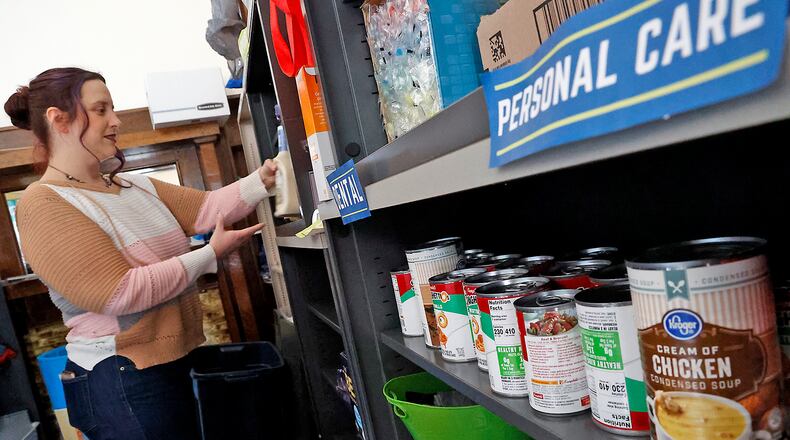As student needs rise, some colleges — including Clark State College and Wittenberg University — have created aid funds and provided other resources to help those students.
“It is very common for college students to experience difficulty related to academic pressures, personal issues or physical and mental health problems during their academic career,” said Dawayne Kirkman, Clark State’s vice president of student affairs.
The Center for Community College Student Engagement surveyed more than 80,000 students at community colleges in 2021. The survey found that 44% of students who needed help getting food said their colleges provided them with that kind of assistance, and 21% who needed help finding affordable shelter and 22% who needed help paying for utilities said their colleges aided them.
The survey found that 29% of students are food insecure, 14% are housing insecure, and students with dependent children have less food and housing security than those without children.
Locally, Clark State College provides students with both internal and external resources from the Office of Student Support, the Second Harvest Food Bank site on campus, its coat and clothing closet, school supplies, hygiene products, housing resource information, state and federal benefits, childcare, food security, transportation, and funding for eligible students.
Wittenberg University also provides students with funding through the Student Emergency Fund, food and hygiene items through a Campus Cupboard, clothes and accessories through the Witt Wardrobe, and supplies donated by the community.
“(The fund is to help) students who encounter an unforeseen financial emergency or an event. Our goal is to help students during a time of need to stay in school and make progress toward a degree,” according to the university.
The fund, created with support from donors, is not intended to replace or supplement existing financial aid and doesn’t have to be repaid.
Nearly half with low food security
Clark State recently surveyed 417 students through an online “Student Financial Wellness Survey” that focused on key findings such as student financial security, basic needs security, mental health challenges and perceptions of institutional support. The survey found 48% of the students showed signs of either low or very low food security.
Kirkman said the results help the college make informed decisions on how to better connect students with the Office of Student Support and community resources.
The college offers funding for students who are Supplemental Nutrition Assistance Program (SNAP) Employment and Training (E&T) participants. The eligible expenses may include automobile repairs, books and course materials, child care, gas and transportation.
This program is to help eligible SNAP recipients gain skills, training, work or experience to increase self-sufficiency. To be eligible, students must live in Clark, Champaign, Greene, Logan or Montgomery counties and be enrolled in a degree or certificate that aligns with an in-demand occupation identified by OhioMeansJobs.
Nina Wiley, assistant vice president of student affairs, said the college has dedicated funds for direct student assistance, and they receive 50% reimbursement from the state for SNAP E&T expenses.
The Springfield campus also has an agency office for Job and Family Services and CareSource representatives to meet with students who are members and their parents.
“Case management services are available to help address personal barriers students may encounter while trying to balance school, work and family responsibilities,” Kirkman said.
The college will connect students with the agency in their county that can provide food assistance and medical coverage, child care and emergency assistance, workforce education and training scholarships, employment opportunities, supportive services, OhioMeansJobs registration and referrals to community resources.
Credit: Bill Lackey
Credit: Bill Lackey
Campus Cupboard
At Wittenberg, the Campus Cupboard, which launched in 2018, is mini food pantry with food items and hygiene products.
A grand reopening of the cupboard will be held from 4 to 6 p.m. on Monday, March 20. It will be open twice a week Mondays and Wednesdays, and there will be grab-and-go options in the commuter lounge for students who may not be able to make it when the cupboard is open.
Some colleges work to offer funds or resources, and some build partnerships with community organizations to provide outside resources that address students’ basic needs.
In turn, the efforts improve teaching and learning.
“Students are connected to resources as early as possible to improve their outcomes for success academically, personally and professionally. This intentional alignment with resources helps guide our students while also promoting self-advocacy and responsibility,” Kirkman said.
Kirkman said support looks different for each student, who is often trying to balance several areas of their lives, and they continue to look for ways to provide and connect them with resources.
At Wittenberg, they work to provide an “interconnected web” of support to students, including student success coaches, counseling services and the student development office.
“If there is a need for food, there may also be added stress that impacts academics, as well as spiritual and mental well-being,” the Rev. Tracy Paschke-Johannes, Matevia Endowed University Pastor, said.
About the Author


